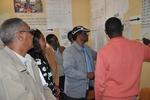Addressing Social Determinants of Health through Community Care Coalitions in Tigray
Addis Ababa. 21 November 2014 – A project established by the Tigray Region’s Bureau of Labor and Social Affairs (BoLSA) in 2009 to address social determinants of health at community level improves access to healthcare and ensures social protection through Community Care Coalitions (CCCs).
The CCC supports women, orphans, persons with disabilities , those with mental health illness , people living with HIV, and the elderly. Mrs Yalem Tsegay, Head of Tigray BoLSA points out that there are 802 CCCs in Tigray, one per kebele or tabia (lowest administrative body). These are led by volunteers who mobilize the community to participate through a monthly fee of 2 birr (USD 0.10) or a yearly contribution of 2kg of flour per household. The CCC distributes flour donation and interest-free cash loans to the needy to help them start up self-help ventures. It also creates access to facility-based delivery for pregnant women, provides social insurance for medical treatment, and care and support for persons living with HIV.
With the support of the World Health Organization Ethiopia, BoLSA engaged in capacity-building of CCC leaders to strengthen their competencies in managing the CCCs and in social mobilization to improve performance and increase memberships.
On 17-19 November 2014, Dr Pierre M’pele-Kilebou, WHO Representative in Ethiopia and his delegation met with the Tigray BoLSA and visited three CCCs in Negash, Yeha and Axum where they observed the services provided to communities and the commitment of the people themselves to contribute to the betterment of their own lives. In Negash, the delegation met pregnant women at a shelter in the compound of the woreda health center, awaiting their delivery date, an action that will ensure institution-based delivery; and visited an income-generating scheme for women started up through loan from the CCC.
Dr M’pele also met with the President of Tigray Region during the mission and expressed WHO’s appreciation and congratulation in the near-achievement of all health-related MDGs and also for involving the community, and for being at the center of change in Tigray Region. Dr M’pele commended the work of the CCCs and the efforts to address social determinants of health through community participation, and confirmed WHO’s continued interest to support the capacity building of the leadership of CCCs that still need strengthening.
For more information please contact
Loza Mesfin Tesfaye
Communications
WHO Ethiopia
Email: tesfayel [at] who.int
Tel: +251 911 144 194
Photo: WHO Ethiopia/Loza M.






